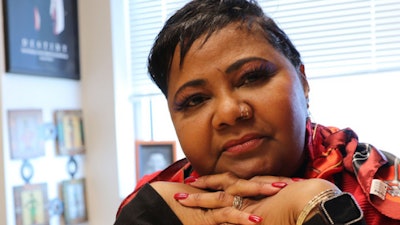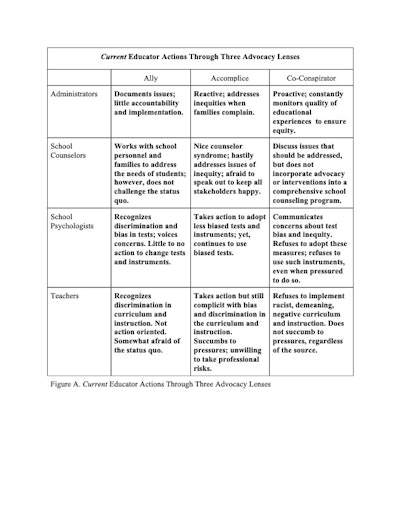 Dr. Donna Y. Ford
Dr. Donna Y. Ford
Moreover, personal biases and beliefs about certain student populations can impede an educator from effectively teaching their students. To become a co-conspirator in education, educators must understand the presenting issues, policies, and socio-political dynamics that serve as barriers to helping students achieve holistic success, especially for Black students. Moreover, educators need a set of strategies to assist them to not only help students but to advocate for them at a transformational level.
We agree with the ally, accomplice, and conspirator framework but think it can go further. In our framework:
 Figure A
Figure A
(b) Accomplices are anti-racist in philosophy and actions, but risk-taking is minimal and reactive.
(c) Co-conspirators are both; they are culturally responsive and anti-racist. They take on the status quo and are willing to take professional risks and reject white privileges. These professionals are proactive.
Following, we attend to education with the understanding that discipline can serve as a bridge to whether Black students are referred for special education or gifted and talented education.
Status of Black students in preK-12 - special education focus
Special education is supposed to be an area where students with unique needs get the supports, resources, and opportunities required for them to be successful in schools. Unfortunately, both Black boys and girls are over-referred and placed (misplaced) in special education, namely high-incidence categories. For many Black males, it has become a space that is disciplinary and punitive due to referrals rooted in inequities - bias, racism, and low expectations in their ability to achieve. Misplacement in special education contributes to underachievement, boredom, and possibly behavioral problems for Black boys and girls. They are not only inequitably overrepresented in special education, but they have no representation in rigorous coursework or gifted and talented programs (i.e., GATE, Advanced Placement).
Resource: We point readers to inspect each area of SPED overrepresentation in the nation, their state, their district, and their school building using the OCR Civil Rights Data Collection (www.ocrdata.ed.gov)
Status of Black students in preK-12 - gifted and talented focus
When it comes to courses for advanced learners (gifted and talented), Black girls and boys, especially boys, are under-referred and underrepresented. Decades of data at all four levels – nation, state, district, and building – expose this injustice and inequity. Denied access to advanced programming and courses contributes to underachievement, boredom, and possibly behavioral problems for Black boys and girls.
In Figure A, we share what educators are currently doing to advocate for Black students’ success, and Figure B shows how educators can transform their level of advocacy to improve outcomes for Black students in their efforts to be co-conspirators in decolonizing education. We share more on decolonization in https://www.diverseeducation.com/from-the-magazine/article/15635677/out-with-the-old-in-with-the-new-decolonizing-the-school-counseling-profession-to-support-black-students.
 Figure B
Figure B
Concluding thoughts and challenges
We offer additional recommendations on how educators can be co-conspirators in unapologetically advocating for the brilliance of Black students to be maximized in a school culture that is accepting, welcoming, and developing their potential from a holistic and humanistic perspective. We acknowledge that there are educators who are advocates for Black girls and boys. However, we want more educators to do more. Too much is at stake for our Black students when educators are not decolonized – co-conspirators.
• Challenge biases and racist beliefs about Black students; this includes recognizing deficit thinking about Black boys and Black girls
• Seek professional development to be equitable, culturally competent, and anti-racist
• Identify and use community resources and support for the advancement and betterment of Black students
• Be proactive; use one’s own privilege and resources to advocate for Black boys and girls
• Center the voices of Black students and communities in beliefs, decisions, and actions
Dr. Erik M. Hines is a professor in the Division of Child, Family, and Community Engagement at George Mason University.
Dr. Donna Y. Ford is a Distinguished Professor of Education and Human Ecology at The Ohio State University.















